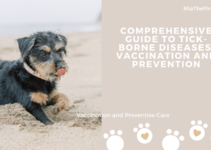Understanding Heartworm Disease in Dogs: Essential Vaccination and Preventive Care
Heartworm disease is a serious and potentially fatal condition that affects dogs all over the world. Understanding the causes, symptoms, and preventive measures is crucial for every dog owner. In this article, we will delve into the intricacies of heartworm disease and highlight the importance of vaccination and preventive care.
What is Heartworm Disease?
Heartworm disease is caused by a parasitic worm called Dirofilaria immitis, which primarily affects dogs but can also infect other animals such as cats, foxes, and even humans. These worms reside in the heart, lungs, and blood vessels of infected animals, leading to severe health complications.
The Life Cycle of Heartworms
The life cycle of heartworms involves several stages. It begins when an infected mosquito bites a dog, transmitting microscopic larvae into the bloodstream. Over the course of several months, these larvae mature and migrate to the heart and lungs, where they grow into adult worms. Once mature, these worms can reproduce and continue the cycle by releasing microfilariae into the bloodstream, which can be picked up by mosquitoes and transmitted to other animals.
Symptoms and Diagnosis of Heartworm Disease
Identifying heartworm disease in its early stages can be challenging as symptoms may not be immediately apparent. However, as the disease progresses, dogs may exhibit symptoms such as coughing, fatigue, weight loss, and difficulty breathing. A veterinarian can perform diagnostic tests, including blood tests and imaging, to confirm the presence of heartworms.
Importance of Vaccination and Preventive Care
Vaccination and preventive care play a crucial role in protecting dogs from heartworm disease. Regular check-ups with a veterinarian are essential for early detection and prevention. Vaccinations, such as the heartworm antigen test, can help identify infected dogs and prevent the spread of the disease to other animals.
Types of Heartworm Preventive Medications
Several effective medications are available to prevent heartworm disease in dogs. These medications, commonly administered monthly, work by killing the immature larvae and preventing the development of adult worms. Some popular preventive medications include oral tablets, topical solutions, and injectables. It is important to consult with a veterinarian to determine the most suitable preventive medication for your dog.
Tips for Preventing Heartworm Disease
While preventive medications are crucial, there are additional steps you can take to minimize the risk of heartworm disease in your dog. Avoiding mosquito-infested areas, especially during peak activity times, can significantly reduce the chances of infection. Additionally, maintaining a clean and mosquito-free environment, using mosquito repellents specifically designed for dogs, and regularly checking for any signs of infection can further safeguard your furry friend.
By understanding heartworm disease, its life cycle, symptoms, and the importance of vaccination and preventive care, you can take proactive measures to protect your beloved canine companion. Remember, prevention is always better than cure when it comes to heartworm disease. Stay informed, stay vigilant, and prioritize your dog’s health.
FAQs
What is Heartworm Disease?
Heartworm disease is a serious and potentially fatal condition caused by a parasitic worm called Dirofilaria immitis. It primarily affects dogs but can also infect other animals. The worms reside in the heart, lungs, and blood vessels, leading to severe health complications.
The Life Cycle of Heartworms
The life cycle of heartworms begins when an infected mosquito bites a dog, transmitting microscopic larvae into the bloodstream. Over time, these larvae mature and migrate to the heart and lungs, where they grow into adult worms. The adult worms reproduce and release microfilariae into the bloodstream, which can be picked up by mosquitoes and transmitted to other animals.
Symptoms and Diagnosis of Heartworm Disease
Identifying heartworm disease in its early stages can be challenging as symptoms may not be immediately apparent. However, as the disease progresses, dogs may exhibit symptoms such as coughing, fatigue, weight loss, and difficulty breathing. A veterinarian can perform diagnostic tests, including blood tests and imaging, to confirm the presence of heartworms.
Importance of Vaccination and Preventive Care
Vaccination and preventive care are crucial for protecting dogs from heartworm disease. Regular check-ups with a veterinarian are essential for early detection and prevention. Vaccinations, such as the heartworm antigen test, can help identify infected dogs and prevent the spread of the disease to other animals.
Types of Heartworm Preventive Medications
Several effective medications are available to prevent heartworm disease in dogs. These medications, commonly administered monthly, work by killing immature larvae and preventing the development of adult worms. Oral tablets, topical solutions, and injectables are popular preventive medications. Consult with a veterinarian to determine the most suitable option for your dog.



